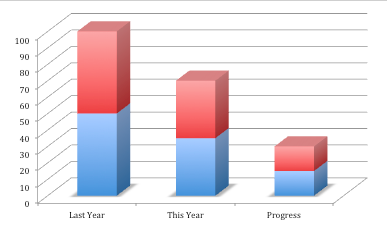A look into attendance: What your absences and tardies mean

Alexander Wang
The attendance coordinator, Sue Prutton works at her desk. Tardies and absences have many consequences for students when appearing in multitudes.
Missing part or all of a day of school can lead to a variety of consequences for Upper School students, but the administration does listen to reasons and is willing to allow students to avoid punishment if their reason for absence is deemed reasonable.
According to Attendance Coordinator Sue Prutton, “students are allowed to have a maximum of seven absences in a semester unless they are a senior…[then] they are allowed three extra absences.” Seniors are given these three extra absences for college visits, which must be approved by the administration first.
Exceeding this number of absences can result in a student losing his or her credits for the classes that he or she has missed. The student would then need to appeal in order to have the credits reinstated.
Credits are not taken away in all cases of absences, as a student who has special conditions such as a chronic illness will not be penalized because of his or her illness. The penalty depends on how much information the administration has regarding the student.
According to Sue Prutton, the most common excuses for absences are illness and appointments such as with a doctor or a dentist.
The other case of missing school is tardiness, which only causes a student to miss a small portion of a class, but is still recorded and has its penalties.
Tardies are kept track of by the quarter system, allowing each student two unexcused tardies per quarter per class without penalty. Each subsequent tardy results in a detention. The two tardies without penalty are to give students some insurance in case something happens to deter their passage to school, such as a tree falling in a student’s driveway. Some exceptions are made, however, for cases such as a students having a class in Nichols Hall right after a class in Shah Hall.
Too many tardies can result in a discussion with the student and further disciplinary action to ensue.
On the topic of excuses for tardies, Prutton says, “tardies are virtually all traffic.” She elaborates on that, saying that traffic is not a very valid excuse, as everyone has to go through the traffic. She then compares the students’ arrivals with those of the teachers, saying that the teachers are expected to be on time for class by the administration and the students by their parents. They have to drive to school through the same traffic as the students, so the same standards should be applied to the students.
“I am only late for fifth period because, the days in which lunch is first for me, there is no bell to signal that lunch is over and that sixth period is going to start,” Akhil Arun (9) said, despite the fact that tardies usually occur in the mornings when a student is arriving at school.
Usually students will not exceed one detention due to tardiness, but there are cases where a students has been late three days in a week, causing an automatic detention.
To reduce tardies and their effect on students, the administration has changed the drop-off loop so that a student is dropped off in a way that is optimal to help him or her avoid a tardy. Ms. Prutton has also started sending out warning emails to students who have accumulated two tardies in a class.
Prutton believes that these changes have had a dramatic improvement on the number of late arrivals and detentions.
“We have had over a 30-percent improvement in the situation in terms of arriving late to school [compared to] last year,” she said.
Prutton and the school administration are still working towards improving the tardy and absence situation at our school.
Alex Wang (12) is the opinion editor for Harker Aquila in his fourth year on staff. He was previously sports editor in his junior year. His favorite part...


















![“[Building nerf blasters] became this outlet of creativity for me that hasn't been matched by anything else. The process [of] making a build complete to your desire is such a painstakingly difficult process, but I've had to learn from [the skills needed from] soldering to proper painting. There's so many different options for everything, if you think about it, it exists. The best part is [that] if it doesn't exist, you can build it yourself," Ishaan Parate said.](https://harkeraquila.com/wp-content/uploads/2022/08/DSC_8149-900x604.jpg)




![“When I came into high school, I was ready to be a follower. But DECA was a game changer for me. It helped me overcome my fear of public speaking, and it's played such a major role in who I've become today. To be able to successfully lead a chapter of 150 students, an officer team and be one of the upperclassmen I once really admired is something I'm [really] proud of,” Anvitha Tummala ('21) said.](https://harkeraquila.com/wp-content/uploads/2021/07/Screen-Shot-2021-07-25-at-9.50.05-AM-900x594.png)







![“I think getting up in the morning and having a sense of purpose [is exciting]. I think without a certain amount of drive, life is kind of obsolete and mundane, and I think having that every single day is what makes each day unique and kind of makes life exciting,” Neymika Jain (12) said.](https://harkeraquila.com/wp-content/uploads/2017/06/Screen-Shot-2017-06-03-at-4.54.16-PM.png)








![“My slogan is ‘slow feet, don’t eat, and I’m hungry.’ You need to run fast to get where you are–you aren't going to get those championships if you aren't fast,” Angel Cervantes (12) said. “I want to do well in school on my tests and in track and win championships for my team. I live by that, [and] I can do that anywhere: in the classroom or on the field.”](https://harkeraquila.com/wp-content/uploads/2018/06/DSC5146-900x601.jpg)
![“[Volleyball has] taught me how to fall correctly, and another thing it taught is that you don’t have to be the best at something to be good at it. If you just hit the ball in a smart way, then it still scores points and you’re good at it. You could be a background player and still make a much bigger impact on the team than you would think,” Anya Gert (’20) said.](https://harkeraquila.com/wp-content/uploads/2020/06/AnnaGert_JinTuan_HoHPhotoEdited-600x900.jpeg)

![“I'm not nearly there yet, but [my confidence has] definitely been getting better since I was pretty shy and timid coming into Harker my freshman year. I know that there's a lot of people that are really confident in what they do, and I really admire them. Everyone's so driven and that has really pushed me to kind of try to find my own place in high school and be more confident,” Alyssa Huang (’20) said.](https://harkeraquila.com/wp-content/uploads/2020/06/AlyssaHuang_EmilyChen_HoHPhoto-900x749.jpeg)


